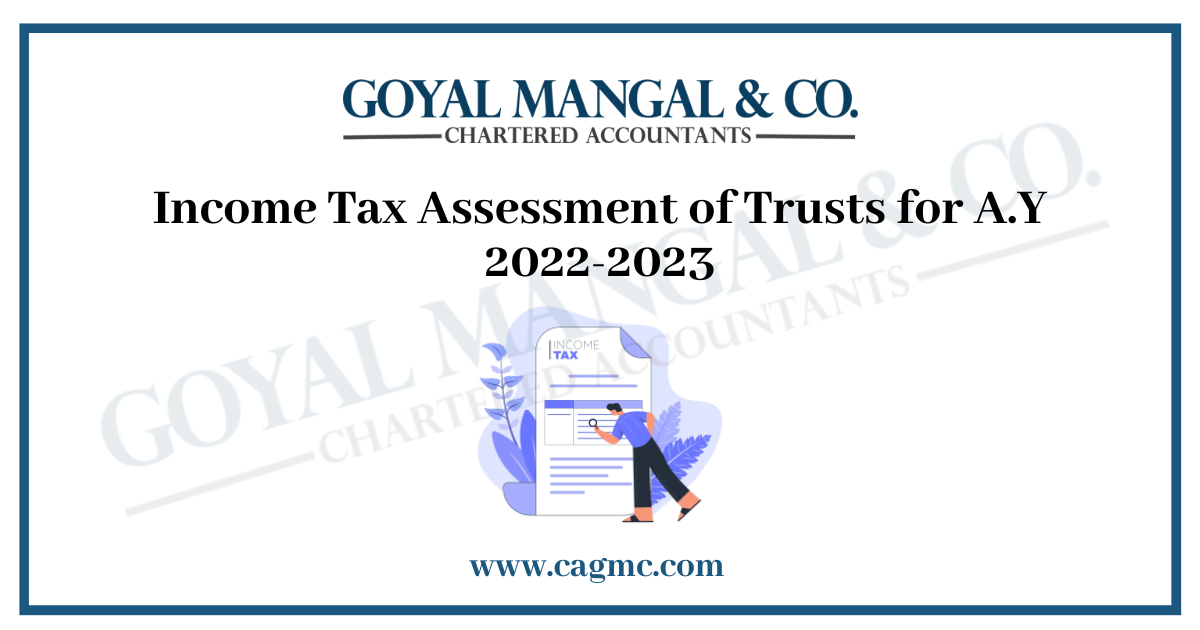
For the income tax assessment, the trusts are important organizations to be considered. Subject to the provisions of section 111 A and section 115, the total income of a business trust will be taxed at a maximum marginal rate. This article discusses the income tax assessment of trusts for A.Y 2022-2023.
|
Table of Contents |
Religious or Charitable Trust
A trust set up for charitable or religious purposes that are not intended for commercial purposes is subject to various benefits under the Income Tax Act, among other things, exemptions under section 11. ‘Religious purpose’ has not been defined under the Income Tax Act. However, Section 2 (15) of the Act defines the “charitable purpose” to include helping the poor, education, medical aid, nature conservation (including wetlands, forests, and wildlife), and the preservation of monuments or places or art objects or historical interest, and the development of any other object used by the general public.
Provided that the development of any other public utility shall not be the purpose of charity, if it includes the carrying out of any activity like trade, commerce, or business, or any activity to provide any service in connection with any commerce, trade or business, in payment or money or any other consideration, whether in the form of expenditure or application, or retention, of income from that activity, unless—
- the work is performed during actual carrying of such advancement used by the general public; and
- the total number of receipts for that service or activities for the previous year, not exceeding 20% of all receipts, trust, or institution performing that function or activities, for the previous year.
Exempted income of Charitable or Religious Trust
Section 11
- income derived from a property held under full trust for charitable or religious purposes, until such income is used for those purposes in India; and, where any income is collected or allocated for such purposes in India, to the extent that the income collected or set is not more than fifteen per cent of the income from that property;
- Income generated from property under the trust only partly for such purposes, the trust was created before the commencement of this Act, to the extent that revenue is used for those purposes in India; and, where any such funds are finally allocated to the application for such purposes in India, to the extent the revenue set aside not more than fifteen percent of the revenue from that area;
- Trustee income from voluntary donations will form part of the trust corpus.
- Capital gains
- Financial gains from the transfer of large assets held entirely for charitable or religious purposes
- If the cost of a new asset is equal to or greater than the estimated residual value, all monetary benefits will be exempted.
- If the cost of a new asset is less than the consideration for the residual sale, the amount representing the cost of the new asset reduced by the cost of the old asset shall be exempted.
- Profit from the transfer of capital assets held only partly for religious or charitable purpose, the portion of the maximum benefit will be exempted.
- Income from voluntary donations (other than those received with specific direction to be part of a trust corpus) received by a fund set up for charitable or religious purposes will be tax-deductible unless the use requirements and restrictions in this regard under sections 11 and 13 they were satisfied— Section 12 (1).
Taxes on Unknown Donations
The total amount of assessee includes any income for an anonymous donation, the income tax payable will be:
- tax @ 30% on aggregate anonymous donations received more than the following namely:
- 5% of total donations received by inspection, or
- Rupees lakh one: and
- the tax assessment would have been charged if the amount of revenue had been reduced by the number of anonymous contributions received over the amount referred to above, as the case may be.
Tax calculation
The trust is taxable according to the slab rates applicable to the individual (not being a super senior citizen or a senior citizen).
Final words
To the extent that the trust income is not covered by the release, the income will be taxed in the same way as the Association of Persons (AoP). Therefore, with an income of up to Rs. 2.5 lakh rupees, we will not be required to pay any taxes. However, it should be noted that AoP tax rates will only apply to income that is not covered by the exemptions granted under the Act to the trusts of charities. The Trust may violate any related conditions to which it has been granted registration under the Act. In such cases, the revenue lost by the exemption will be taxed at the maximum marginal rate (MMR). Hence the income tax assessment of trusts for A.Y 2022-2023 could be understood through this article.


